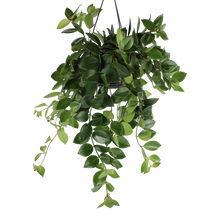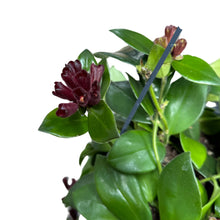Aeschynanthus pulcher is part of the Gesneriaceae family, they are epiphytes that would ordinarily grow on host trees in tropical forests of Thailand, Singapore, Sumatra and other parts of Southeast Asia. Leaves are fleshy, elliptic and with smooth margins,, they are arranged in pairs along a trailing stem. Flowers are red and tubular in shape and surrounded by a tubular calyx (an outer covering of the petals) and grow in clusters at the ends of the stems.
Aeschynanthus comes from the Greek words ‘aischune’ meaning shame and ‘anthos’ meaning flower referring to the red flowers. The Latin specific epithet pulcher means beautiful.
Light: Bright indirect light, meaning the plant sees the sun for 0-4 hours per day - this could be through trees or a translucent curtain, it’s important for the plant to see the sky in order to thrive.
Water: Allow the first 2-3 inches of mix to dry out. Before watering, ensure the substrate isn’t compacted, if it is, aerate it with a few pokes of a skewer or blunt stick, pour water slowly over the top and allow the water to pass through the drainage holes.
Potting mix: A well draining mix composed of coco coir, perlite or vermiculite, orchid bark, sphagnum moss, worm castings and horticultural charcoal.
Fertilising: Feed your plant every other watering during the growing season or when you observe active growth. You can dilute fertiliser to half the recommended amount but never add more.
Temperature: Ideally 21-26°C, no cooler than 10°C.
Humidity: Aeschynanthus do better in higher humidity but do well to adapt to average home humidity. You can increase humidity by placing the plant on a watered pebble tray or using a humidifier.
Aeschynanthus are non-toxic.



